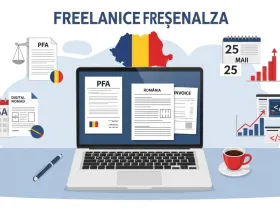It might stem from a simple wish. Perhaps it’s the melody of waves from a podcast or a friend’s Instagram story from Lisbon’s cobbled streets.
A Romanian freelancer, toiling from his/her Cluj or Iasi’s apartment, takes a break. What if the work could be done from any location, not bound to a specific region?
Emails, client calls, quiet windows of the boundless creativity flowing—what if all these could unfold from a place where sunsets are enjoyed over the Atlantic?
For a substantial count of Romanian freelancers in 2025, this is no longer a far-fetched fantasy. It’s a practical shift that has been planned out. Portugal is no longer just a tourist brochure.
It transforms into an actual home base where freelancers arrive with laptops and aspirations, seeking more than just better weather. As it turns out, this country by the sea offers more than mere postcards. It provides a way to live well, earn fairly, and find a rhythm in a place that is surprisingly friendly to online workers.
Key Takeaways
- Romanian freelancers relocated to Portugal not simply to bask in the sun, but to embrace a more balanced and sustainable approach to living and working.
- As EU citizens, Romanians have an easier path to residency as well as the option to retain or modify their freelance business activities outside the country.
- The change is holistic—business structure optimization, housing, tax numbers, local assimilation, financial forecasting, and integration.
- Portugal nurtures more than productivity; it fosters growth, tranquility, self-renewal, and personal flourishing.
- The relocation isn’t about fleeing Romania. It is about actively choosing a lifestyle that carves out space for meaningful work alongside living well.
The Quiet Magnetism of Portugal for Freelancers
“Portugal has a soft allure. Unlike attention-seeking cities, it lives quietly in the back of your mind until one day, it starts to crop up everywhere. Perhaps, it is the abundance of freelancers who already live there. Or, it is the ease of strolling down a sunny street devoid of slush and unreasonably high rents.
Whatever the case, more and more Romanians are making their way to the west—not in order to escape Romania, but in order to redesign life while keeping the work they love close.”
Lisbon and Porto need no introduction. They are vibrant, beautiful cities with a plethora of cafés where freelancers work breathtaking views.
But even less known places such as Coimbra or the Algarve coast are now especially popular for those looking for tranquility, reliable internet, or a sense of community. Portugal does not make attempts to be trendy. It just works—works for living, for working, and for starting a new life without starting over.
Freelancers often notice the changes Portugal has to offer within the first few weeks of working.
There is a radical difference in pace and the way deadlines are handled. While deadlines are a part of the working atmosphere, the surrounding environment creates breathing space. Feeling the ocean breeze, listening to street musicians, or even taking a break with some fresh bread makes client revision days feel like a breeze.
What EU Citizenship Means for Romanian Freelancers
A standout advantage that Romanian freelancers have in choosing Portugal is the ease of movement. Portuguese permits no special visas or permissions for Romanian citizens to reside, work, or register their presence in the country.
This is not just legal theory; it is life simplification in action that is available, usable, and devoid of convoluted forms.
Becoming a resident of Portugal does not mean severing connections with Romania or home businesses. During the transition phase, one may continue to hold their PFA registration from Romania while residing in Portugal.
Should you opt to relocate permanently, you can also register, reclaim public services, and open a business legally under Portuguese jurisdiction. There are no mandates. Everything is voluntary and dictated by you while Portugal provides ample opportunities.
There is an element of warmth that Portugal which makes it easier to navigate compared to other furthest places. Although the language is different, the warm welcome, the culture of shared meals, and even the Mediterranean ethos resonates with what most Romanians deeply cherish.
It does not evoke the foreign strangeness that some cities do. It feels like a family member you haven’t interacted with in a while, but easily reconnect with once you are together.
The Legal and Practical Steps That Make the Move Real
Every move starts small. You have to have somewhere to live. You have to have a tax number. You must register your place of residence if your stay exceeds three months. And yes, there is red tape, but for all its problems, Portugal has a wonderfully humane touch to its bureaucracy. There are many locals who are familiar with expatriates.
Staff in the offices are often fluent in English. Getting your NIF, Portugal’s Tax Identification Number, allows you to access leases, contracts for cellular service, and certain public services.
Finding accommodation can be a particularly tedious task in large, metropolitan areas. Availability, pricing, and location all need to be considered for Lisbon, where prices have increased. Many freelancers begin their journey with short-term rentals while searching for more permanent options. Above all, patience is crucial. Everything in Portugal runs on “Portuguese time,” which means that what feels stressful in the moment tends to resolve itself with time.
After you move in, you can decide what to do with your freelance status. While some Romanians choose to continue invoicing under their PFA, others make use of Portugal’s “recibos verdes” system. This is a freelancer registration that allows one to invoice, declare income, and pay social security locally.
The selection will depend on your plans, income, and if you plan to use Portugal as a seasonal base or a permanent residence. Many tend to maintain their Romanian connections initially, and then navigate the system as they gain a clearer understanding.
What Changes—and What Doesn’t—When You Work From Portugal
New sights and sounds accompany waking up, but returning to old habits is inevitable.
Old habits now include grabbing a cup of coffee and sipping it while scrolling through work on your laptop. Although light blue skies and bird sounds replace the usual grey silence and winter garb.
While the tasks may remain unchanged, the surrounding factors give the work a completely fresh feeling.
Romanians that have shifted to freelance work from an office complain of lack of motivation and distractions. Relocating on the other hand seems to put things into perspective regarding the value of time and even life decisions.
Your timezone changes by 2 hours for Romanian clients which is a small difference.
In this case, both sides benefit—waking up to soothing calmness is ample when mornings are free from clutter, and exploring during the evening is also possible. Responding to client queries is also flexible, especially because they don’t disappear from the grid, just the usual route.
Building Support Systems and Finding Your People
Portugal has many freelancers and one of their foremost concerns is moving abroad, which for many comes with added fear of loneliness. Doing remote work, going to different countries, even ones that might be stunning, can amplify one’s perception of isolation. Alongside this, Portugal never ceases to amaze with how readily available a sense of belonging is.
In Lisbon, Second Home and Heden are coworking spaces that do not simply provide desks; they also foster relationships. In Porto, remote worker meetups take place every week. Language centers function as social clubs. Through social media, many Romanians, Poles, Germans, and Brazilians believe it to be a good idea to help one another through tips, organizing dinners and forums.
To have a sense of connectedness, there is no need to be an extrovert; all it takes is curiosity, welcoming a simple question, and openness towards an invite. More often than not, the best moments occur spontaneously. A casual conversation at a café might turn into a hiking adventure over the weekend. Tables joined for lunch might evolve into a weekly gathering. Portugal is discreet, but attentive. If one is welcoming, it responds readily.
Taking Care of Health and Financial Stability Abroad
One of the most comforting aspects of settling in Portugal is healthcare. With a European Health Insurance Card, Romanians get access to public healthcare during their temporary stays. Private insurance is recommended for longer stays. The costs are reasonable, the services are reliable, and if you need something more personalized, expat-focused clinics are easy to find.
Your financial situation abroad is largely dependent on how well you manage the transition. Stability depends on how well you manage the transition. If you’re billing clients in euros, you’re already aligned. If you’re still working with Romanian clients in RON, funds can be converted and payments received using Wise or Revolut without large fees. obrancos are straightforward and most freelancers can open an account with basic documents and proof of residence.
Taxes can be confusing at first. You should speak to an accountant, ideally one familiar with both Romanian and Portuguese systems, to help devise a strategy to prevent missing out on exemptions or end up double-taxed. Portugal provides new residents tax incentives under the NHR regime and some may qualify lower rates based on income type. The best decision is the one made with full knowledge.
My Opinion
Portugal ceases to be a temporary getaway at some point. The stores know your name. You have a favorite park bench. Your shopping list is bilingual. You do not qualify as a visitor anymore. You are someone who resides here and freelances with intention, who greets each day with a different kind of serenity, and who knows that freedom goes well beyond geography. It is about backup, security, and dignity.
Not every Romanian freelancer stays perpetually. Some have a return flight booked after one season, while others travel from country to country with Portugal as their hub. But for many, the country brings something they didn’t know they were missing. Instead, the space to breathe. The time to reflect. The active permission slip to do impactful work without joy being a sacrificial act.
And this is not only self-centric. Movers face business changes, too. With Portugal being their newfound home, migrants mark Portugal as the new base for cross-border business trips, raising their fees, and elevating overall brand image after. It is amazing the kind of better clients they are able to attract and increase collaborations. Something about the slower-paced city melts away stress, and rivals Parisian cafes.
















Leave a Reply
View Comments